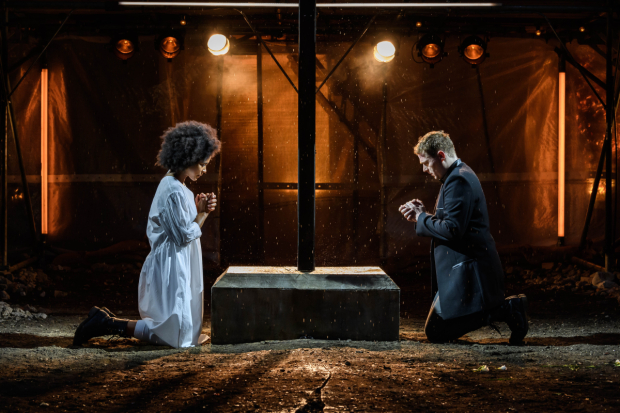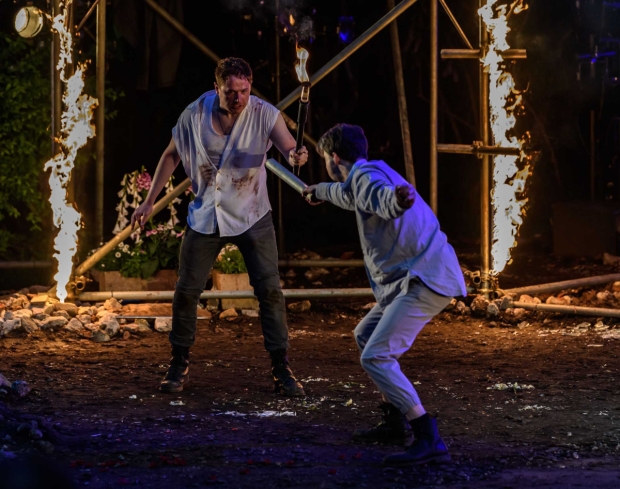Review: Romeo and Juliet (Regent's Park Open Air Theatre)
Shakespeare’s tragedy is given a thrilling revival

© Jane Hobson
From the Baz Luhrmann 1996 film to visionary Icelandic company Vesturport's funky circus-based romp nearly tearing the roof off the Young Vic a few years back, to West Side Story, with countless iterations in between, few Shakespeares lend themselves to modernisation as readily as this one. Maybe it's the youthful ardour of the lovers, or the timelessness of warring families that can so easily be reimagined as contemporary gangs, but Romeo and Juliet is a story that constantly hurtles through chronological time, dynamically reinventing itself.
In fact, Kimberley Sykes's sizzling new production for Regent's Park has it both ways, depicting these "two households, both alike in dignity" as inhabiting a world as grimly violent as it is effortlessly hip. These people have wealth, but they are formidably streetwise. While that isn't a particularly original spin on this most malleable of texts, the ferocity of the pace here, plus the clarity of the storytelling and several pleasingly inventive touches including a terrific way of staging the deaths (we see the souls leave the bodies), and unexpected gender-flipping of some principal characters, means this feels bracingly modern, but seldom gimmicky.
At the outset we appear to be in some sort of war zone, Giles Thomas's distressingly vivid sound effects providing an aural counterpart to Naomi Dawson's scaffolded set: part-building site, part-warehouse rave location, atop an ominously symbolic fissure in the earth of the stage floor. This is emphatically not a production that luxuriates in the sylvan beauty of the Park: with its predominantly muted colour pallet, it would look equally at home in a quarry or an aircraft hangar. The unforgiving urban angularity, both visually and in Thomas's exciting musical score which runs throughout the interval-free two hours like doom-infused quicksilver, pays dividends though, throwing the moments of tenderness between the central pair into stark and affecting relief. The hypnotic but vaguely unsettling thrum of dance beats suddenly gives way to the purity of classical strings….

© Jane Hobson
It helps that Joel MacCormack and Isabel Adomakoh Young are such engaging and unconventional "star cross'd lovers". Here is an unusually lugubrious, thoughtful Romeo, with a beautiful way with the verse, while she is all fire and energy, and together they're a living embodiment of the old adage that opposites attract. It is impossible not to care what happens to them.
In a production long on striking contrasts but short on humour, the death of Cavan Clarke's impressive, swaggeringly athletic Northern Irish Mercutio is played for jet black laughs only to make his anguished last-gasped "a plague on both your houses" curse all the more bitterly tragic: it's a chilling theatrical moment in an evening studded with them.
Other performances are equally good, and audacious; Aretha Ayeh's passionate Benvolia, Michelle Fox's icily effective Tybalt and the uncommonly sympathetic Paris of Richard Leeming looming particularly large. As the Capulets, Ellie Beavan and Andrew French also make more of an impression than usual, presenting a pair that can switch alarmingly from jovial to brutal in the blink of an eye. Emma Cunniffe's Nurse may not score the laughs that many of her predecessors have found in the role but becomes an increasingly welcome warm, honest presence amongst the adults.
Sykes's directorial concept seems to be driven by the sometimes overlooked realisation that the entire action takes place over a mere four days, resulting in a R&J that comes at you like a sleek but deadly train: very fast but never rushed and entirely in control (although Kev McCurdy's fight sequences feel authentically dangerous). If the pay-off is that we lose almost all the comic business and some of the poetry, I would suggest that's a small price for a version that gets to the bruised heart of Shakespeare's text with a refreshing urgency and, for a play that features so much death, vitality.












